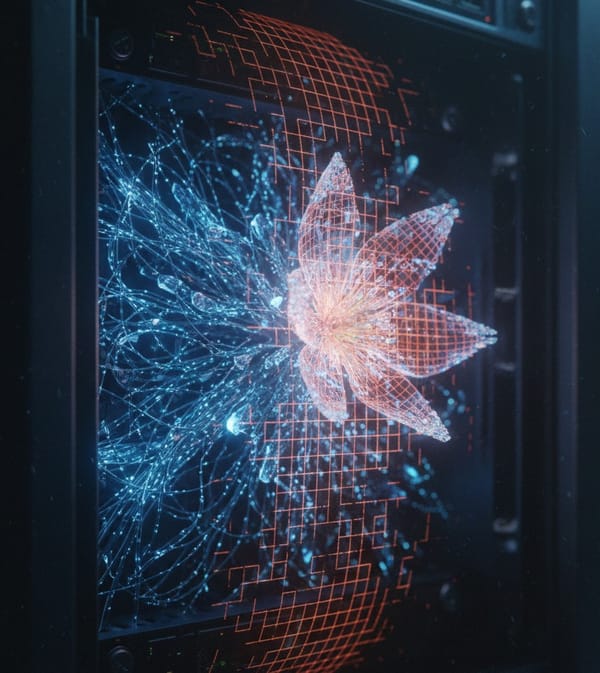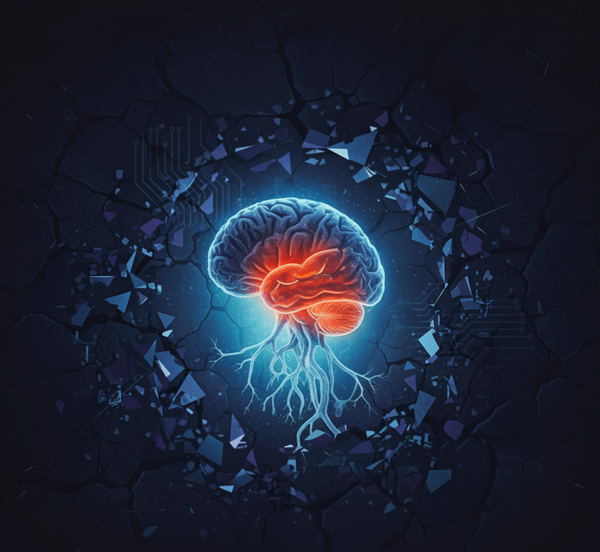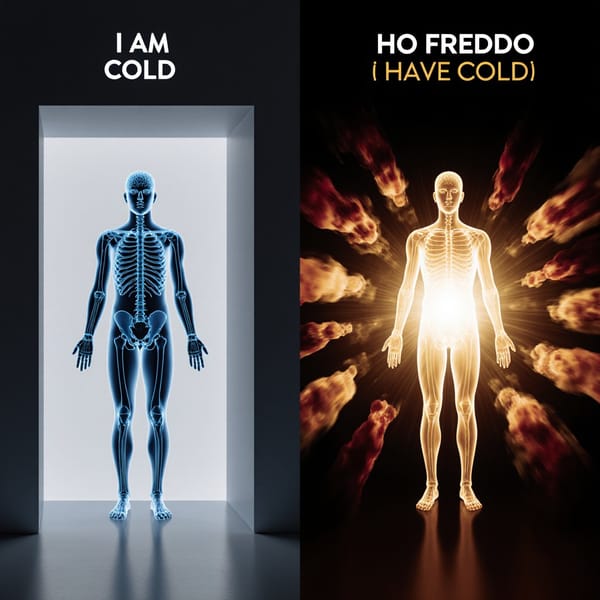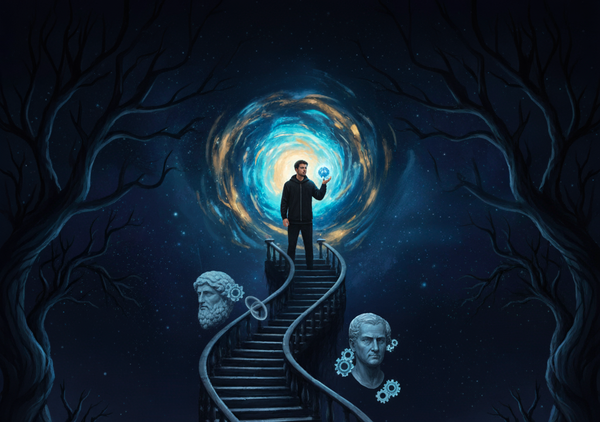The Next Frontier: What Is the Act of Conceptualizing?
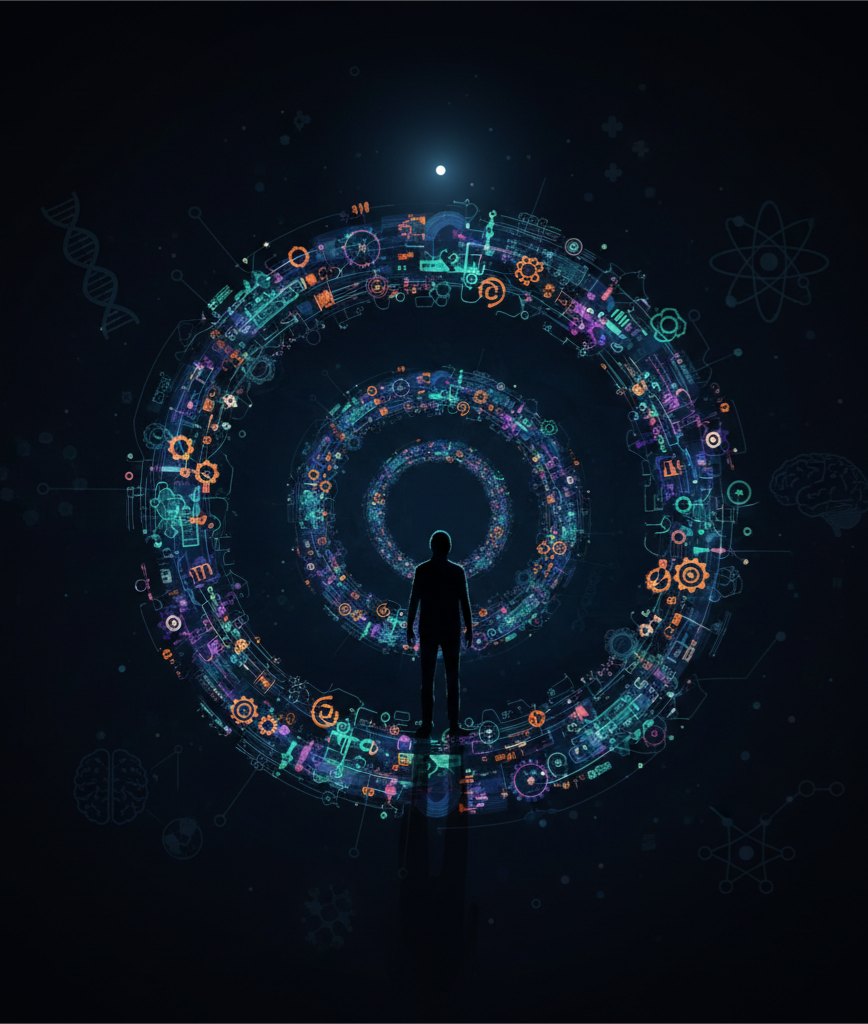
We live trapped in a circle of our own making. We reason with concepts about objects and other concepts. We understand objects through concepts. We create new concepts by combining existing objects and concepts. Around and around we go, never stepping outside this conceptual machinery to ask the most fundamental question of all: What is the act of conceptualizing itself?
This circular trap extends far beyond academic philosophy—it shapes how we approach every mystery that matters. When biologists claim they understand life because they've mapped DNA, they're using concepts (genetic code, protein synthesis, natural selection) to analyze objects (cells, organisms, ecosystems). When AI researchers insist they understand intelligence by building neural networks, they're deploying concepts (computation, information processing, pattern recognition) to model objects and concepts (brains, minds, cognitive systems).
But what if the most profound understanding—let’s call it comprehension—comes not from better concepts or more sophisticated objects, but from investigating the very capacity that makes conceptualizing and object-formation possible in the first place? Can we comprehend the act of understanding itself? And what about the act of reasoning—or the act of feeling the truth of a statement? Finally, can we formalize comprehension as a process that is not itself based on concepts and objects—a process that allows a researcher to analyze and formally express, in the third person, the very acts of conceptualization and object-formation?
The Limits of Conceptual Analysis
Consider what happens when we try to understand life through biological concepts. Science can map relational patterns with extraordinary precision—how genetic replication relates to inheritance, how cellular metabolism relates to energy flow, how molecular interactions relate to phenotypic expression. This gives us tremendous predictive and manipulative power.
Yet something essential remains untouched: the immediate feeling of life itself. When you encounter a living tree, there's a qualitative presence—a felt sense of vital, autonomous creativity—that isn't captured by knowing about photosynthesis or cell division. Science can correlate your recognition of "life" with various biological processes, but it cannot explain why there should be any feeling of aliveness at all.
The same applies to intelligence. We can map neural correlates, build AI systems that exhibit intelligent behavior, trace the relationships between logical operations and problem-solving outcomes. But the feeling of intelligence—that immediate sense of "getting it," of genuine understanding, of being in the presence of mind rather than mere computation, of the autonomous creation of concepts and objects—remains completely mysterious.
Why? Because science works when the feelings it maps—concepts and objects in time, space, quantity—remain stable and universal. But life and intelligence are precisely what resist such stability. They're characterized by autonomous creative unpredictability, contextuality, irreducible particularity. A living system generates novelties that couldn't be predicted. In the case of intelligence, each act of genuine understanding is singular, unrepeatable, emerging from the unique intersection of a particular mind.
The Quantum Mystery
Quantum mechanics reveals this limitation in an even more striking way. The mathematical formalism works with extraordinary precision—we can predict quantum phenomena and build technologies that depend on quantum effects. Yet the conceptual interpretation remains utterly mysterious. What does it mean for a particle to be in superposition? What is the nature of quantum measurement? What constitutes observation?
These questions persist not because we lack better concepts, but because quantum phenomena seem to resist conceptual analysis entirely. The act of measurement—the moment when quantum possibilities collapse into definite outcomes—points toward something that exceeds the relationship between concepts and objects. It suggests that Quantum Mechanics deals with pre-conceptual and pre-objectual interactions, rather than objects and concepts.
Richard Feynman famously declared that no one can understand Quantum Mechanics. He was right, because the behavior of understanding only works with concepts and objects. It cannot work when we deal with pre-conceptual, pre-objectual interactions. Quantum mechanics may be one aspect of the capacity that Geneosophy investigates—the primordial creative activity that generates both concepts and objects, but which itself transcends conceptual analysis.
The Conceptual Prison
This points to a deeper issue: we’re trapped in what we might call “conceptual reductionism”—the assumption that understanding consists entirely in analyzing given phenomena with given conceptual tools. Whether we’re materialists using concepts like “matter” and “causation,” or idealists using concepts like “consciousness” and “meaning,” we remain within the same basic methodology: taking objects and concepts as foundational and using them to organize other objects and concepts.
But what if concepts and objects themselves are not foundational? What if they are the acts of a primordial capacity—an autonomous creativity that gives us both concepts and objects?
This is where we encounter the profound limitation of all traditional approaches, including philosophy itself. Philosophy typically works with already-constituted categories and asks questions like “What is consciousness?” or “What is knowledge?” Even dynamic approaches like process philosophy still operate by analyzing processes that are already conceptually delineated.
The Geneosophy Turn
Geneosophy—literally “the wisdom of generation”—represents a fundamental reorientation. Instead of asking “What is X in terms of Y?” it asks, “What are the conditions that allow X to be available as a distinct experience?” Instead of analyzing given concepts and objects, it investigates the primordial act that makes conceptualizing and object-formation possible—as well as understanding, reasoning, and all the behaviors we take for granted.
This isn’t another philosophical position competing with others. It’s a methodological revolution that steps outside the entire game of conceptual analysis to examine the capacity that makes all conceptual games possible.
Think of it this way: rather than endlessly mapping the streams at a river’s estuary, Geneosophy turns upstream to investigate the source. It recognizes that all our various forms of knowledge—scientific, philosophical, artistic, mathematical—are expressions of the same fundamental creative capacity. The question becomes: What is this capacity, and how does it allow us to feel the rich diversity of conceptual and objective experience?
From Having Concepts to Being Conceptual
In this light, concepts and objects aren’t things we have or encounter, but dynamic expressions of a more fundamental activity. A concept like “tree” isn’t an abstract mental representation, but a specific way we feel relatedness—how various feelings (vertical extension, organic texture, seasonal change, rootedness) coordinate and belong together.
Objects, similarly, aren’t things-in-themselves but stable patterns of feeling-coordination. A “rock” is a remarkably consistent coordination between feelings of hardness, resistance, weight, spatial persistence, visual solidity. These feelings coordinate so reliably that we experience them as unified objects rather than separate qualities.
But here’s what’s revolutionary: we don’t just have concepts and encounter objects—we are conceptual and objective activity. The capacity to form concepts and constitute objects is what we most fundamentally are. It is on top of this capacity that we use concepts, objects, understanding, and reasoning.
Investigating the Act Itself
This opens entirely new domains of inquiry. Instead of asking whether consciousness is really computational or whether life is really chemical, Geneosophy asks: What enables the feeling of intelligence to be available? What are the conditions that allow the experience of aliveness to be available? How does the capacity for meaning-making arise?
Consider the act of understanding itself. When you suddenly “get” a complex idea, something extraordinary happens that can’t be reduced to information processing or neural correlation. There’s a felt moment of creative synthesis where new meaning emerges. Geneosophy investigates the conditions that make such moments possible.
Or consider the act of feeling truth. When you recognize that something is true—whether a mathematical proof, a scientific discovery, or a personal insight—there’s an immediate felt quality of rightness that isn’t reducible to logical consistency or empirical confirmation. Geneosophy explores what enables this feeling of truth-recognition to emerge.
Beyond the Subject-Object Split
What’s most profound about this approach is how it dissolves traditional philosophical problems rather than trying to solve them. The endless debate between subjective and objective perspectives becomes irrelevant when we recognize that both subjectivity and objectivity are expressions of the same fundamental creative activity.
Science and phenomenology, materialism and idealism, analysis and intuition—all become different expressions of this primordial capacity. The goal isn’t to choose between them but to understand the creative source that makes all of them possible.

